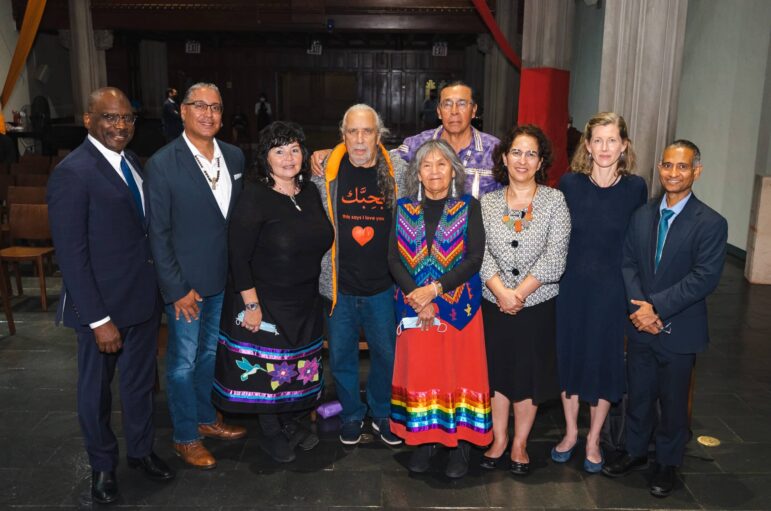
Our Sacred Relationships to the Natural World: Indigenous Leaders Discuss UN Report on Freedom of Religion or Belief
The world needs “a sustained conversation between advocates of freedom of religion or belief and advocates of the rights of Indigenous peoples.” That was a central message from Professor Ahmed Shaheed, the former United Nations Special Rapporteur on Freedom of Religion or Belief, at a forum organized by the Center for Earth Ethics on October 26.
Speaking to members of Indigenous groups, faculty, students and guests gathered in James Chapel at Union Theological Seminary in New York, Shaheed, who teaches international law at the University of Essex Law School (U.K.), discussed key findings and recommendations from his report, “Indigenous Peoples and the Right to Freedom of Religion or Belief,” which was presented to the UN General Assembly the day before.
State and non-state actors “lack understanding” of Indigenous peoples, who face unique challenges. “Given the inextricable relationship between the land and the sacred for many Indigenous peoples, many believe that restricting access and use of their territories is tantamount to prohibiting spiritual experiences,” he said. “Protecting the environment is an important aspect of protecting the rights of Indigenous peoples.”
Even though “Indigenous peoples are often disproportionately vulnerable to environmental crises including climate change, many are uniquely positioned as traditional custodians to use their spiritual and traditional knowledge to sustain nature.”
“The best way to protect nature is to protect the lives of those living there.”
Tadodaho Sid Hill of the Haudenosaunee Confederacy welcomed the guests with a traditional greeting, while representatives from North American Indigenous communities responded and offered reactions to the report.
Betty Lyons (Onondaga Nation, Haudenosaunee Confederacy), the president and executive director of the American Indian Law Alliance, in upstate New York, said that the report is “refreshing and maybe very hopeful.” The report opens how we “define and practice” what is called freedom of belief.
It is important to understand that the notions of religion and belief are two areas external to us as Indigenous peoples. It is not the belief, but our sacred relationships to the natural world, as we breathe in oxygen in our lungs that came from the trees outside,” she said.
Lyons also praised the report’s discussion of the Doctrine of Discovery, which has been used to justify the dispossession and destruction of Indigenous peoples in the Americas.
"... the best way to protect nature is to protect the rights of those living there."
Ahmed Shaheed Tweet
In recorded remarks, Bernadette Demientieff (Gwichyaa Zhee Gwich’in), the executive director of the Gwich’in Steering Committee, drew a harsh contrast between the situation faced by Indigenous people in her native Alaska experience and what their spirituality calls for. The land, “the place Creator blessed us with,” is “being turned into an oil field,” she said. ““You need Nature, you need trees, even dirt.”
“Leave some of the world in way the Creator wants it,” she said. “Respect our spirituality. We deserve the same respect everyone else has.”
CEE Senior Fellow Mona Polacca (Havasupai, Hopi and Tewa) emphasized fundamental aspects of her spiritual outlook. “The Original Instructions are our way of life,” she said. “In our sacred relationships, we must always remember that there is a balance that we must maintain.” The “practice of reciprocity” is central. “Give before you take. We take only what we need; we leave some for the rest.”
“Our challenge is what to continue to hold on to, and what from Western society are we going to embrace,” she said. “We have the responsibility as Indigenous people to be the gentle reminder” to the rest of the world.
UN Special Rapporteur on the Rights of Indigenous Peoples Francisco Calí Tzay (Maya Kaqchikel, Guatemala), who appeared on tape, echoed Shaheed’s condemnation of the impacts of “colonization, forced assimilation and dispossession.” And he criticized the “stigmatization or restriction” of Indigenous spiritual practices, as well as refusals to return “ceremonial objects and remains.” There is a real need “to learn from Indigenous knowledge systems.”
Nazila Ghanea, a professor in international human rights law at the University of Oxford, who has succeeded Shaheed as special rapporteur on freedom of religion or belief, described her mandate as protecting “the realm of conscience and the freedom that offers.” She noted that this report “is the first time there’s been a standalone report” on Indigenous peoples. Now, “it’s on the record and in the mandate,” she said.
“The mandate is being enriched by this perspective,” Ghanea said.
In thanking the participants and guests, Executive Director Karenna Gore announced that this forum would be the first of several program that CEE will organize to address freedom of religion or belief for Indigenous peoples. “We commit ourselves to whatever conversations necessary to carry this work through,” she said.

